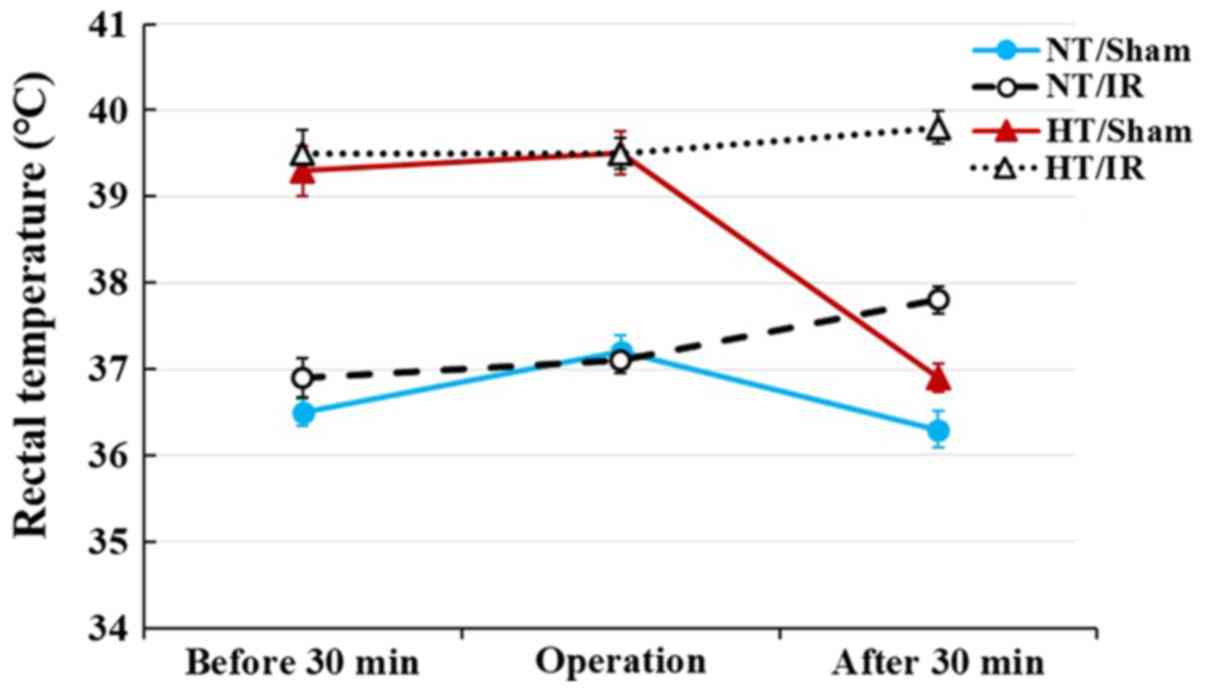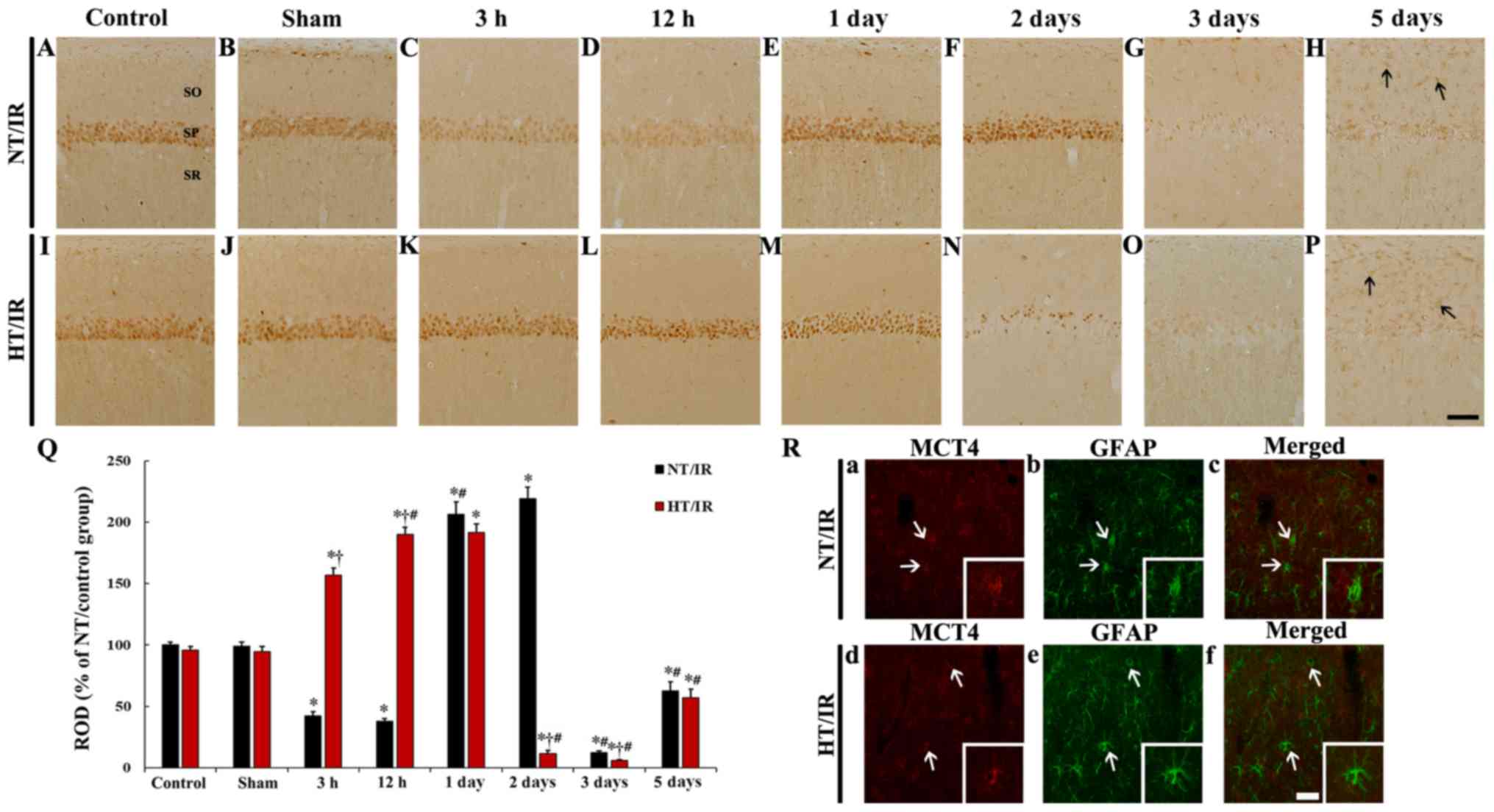|
1
|
Kirino T: Delayed neuronal death in the
gerbil hippocampus following ischemia. Brain Res. 239:57–69. 1982.
View Article : Google Scholar : PubMed/NCBI
|
|
2
|
Onken M, Berger S and Kristian T: Simple
model of forebrain ischemia in mouse. J Neurosci Methods.
204:254–261. 2012. View Article : Google Scholar : PubMed/NCBI
|
|
3
|
Lee CH, Yoo KY, Choi JH, Park OK, Hwang
IK, Kim SK, Kang IJ, Kim YM and Won MH: Neuronal damage is much
delayed and microgliosis is more severe in the aged hippocampus
induced by transient cerebral ischemia compared to the adult
hippocampus. J Neurol Sci. 294:1–6. 2010. View Article : Google Scholar : PubMed/NCBI
|
|
4
|
Liu F and McCullough LD: Interactions
between age, sex, and hormones in experimental ischemic stroke.
Neurochem Int. 61:1255–1265. 2012. View Article : Google Scholar : PubMed/NCBI
|
|
5
|
Manwani B, Liu F, Scranton V, Hammond MD,
Sansing LH and McCullough LD: Differential effects of aging and sex
on stroke induced inflammation across the lifespan. Exp Neurol.
249:120–131. 2013. View Article : Google Scholar : PubMed/NCBI
|
|
6
|
Busto R, Dietrich WD, Globus MY and
Ginsberg MD: The importance of brain temperature in cerebral
ischemic injury. Stroke. 20:1113–1114. 1989. View Article : Google Scholar : PubMed/NCBI
|
|
7
|
Corbett D and Thornhill J: Temperature
modulation (hypothermic and hyperthermic conditions) and its
influence on histological and behavioral outcomes following
cerebral ischemia. Brain Pathol. 10:145–152. 2000. View Article : Google Scholar : PubMed/NCBI
|
|
8
|
Kim DW, Cho JH, Cho GS, Kim IH, Park JH,
Ahn JH, Chen BH, Shin BN, Tae HJ, Hong S, et al: Hyperthermic
preconditioning severely accelerates neuronal damage in the gerbil
ischemic hippocampal dentate gyrus via decreasing SODs expressions.
J Neurol Sci. 358:266–275. 2015. View Article : Google Scholar : PubMed/NCBI
|
|
9
|
Kim MJ, Cho JH, Cho JH, Park JH, Ahn JH,
Tae HJ, Cho GS, Yan BC, Hwang IK, Lee CH, et al: Impact of
hyperthermia before and during ischemia-reperfusion on neuronal
damage and gliosis in the gerbil hippocampus induced by transient
cerebral ischemia. J Neurol Sci. 348:101–110. 2015. View Article : Google Scholar : PubMed/NCBI
|
|
10
|
Barber PA, Hoyte L, Colbourne F and Buchan
AM: Temperature-regulated model of focal ischemia in the mouse: A
study with histopathological and behavioral outcomes. Stroke.
35:1720–1725. 2004. View Article : Google Scholar : PubMed/NCBI
|
|
11
|
Campos F, Blanco M, Barral D, Agulla J,
Ramos-Cabrer P and Castillo J: Influence of temperature on ischemic
brain: Basic and clinical principles. Neurochem Int. 60:495–505.
2012. View Article : Google Scholar : PubMed/NCBI
|
|
12
|
Kim Y, Busto R, Dietrich WD, Kraydieh S
and Ginsberg MD: Delayed postischemic hyperthermia in awake rats
worsens the histopathological outcome of transient focal cerebral
ischemia. Stroke. 27:2274–2280, discussion 2281. 1996. View Article : Google Scholar : PubMed/NCBI
|
|
13
|
Satoh K, Niwa M, Binh NH, Nakashima M,
Kobayashi K, Takamatsu M and Hara A: Increase of galectin-3
expression in microglia by hyperthermia in delayed neuronal death
of hippocampal CA1 following transient forebrain ischemia. Neurosci
Lett. 504:199–203. 2011. View Article : Google Scholar : PubMed/NCBI
|
|
14
|
Wang CX, Stroink A, Casto JM and Kattner
K: Hyperthermia exacerbates ischaemic brain injury. Int J Stroke.
4:274–284. 2009. View Article : Google Scholar : PubMed/NCBI
|
|
15
|
Saxton C: Effects of severe heat stress on
respiration and metabolic rate in resting man. Aviat Space Environ
Med. 52:281–286. 1981.PubMed/NCBI
|
|
16
|
Wood SC and Gonzales R: Hypothermia in
hypoxic animals: Mechanisms, mediators, and functional
significance. Comp Biochem Physiol B Biochem Mol Biol. 113:37–43.
1996. View Article : Google Scholar : PubMed/NCBI
|
|
17
|
Arnberg F, Grafström J, Lundberg J,
Nikkhou-Aski S, Little P, Damberg P, Mitsios N, Mulder J, Lu L,
Söderman M, et al: Imaging of a clinically relevant stroke model:
Glucose hypermetabolism revisited. Stroke. 46:835–842. 2015.
View Article : Google Scholar : PubMed/NCBI
|
|
18
|
Karaszewski B, Wardlaw JM, Marshall I,
Cvoro V, Wartolowska K, Haga K, Armitage PA, Bastin ME and Dennis
MS: Early brain temperature elevation and anaerobic metabolism in
human acute ischaemic stroke. Brain. 132:955–964. 2009. View Article : Google Scholar : PubMed/NCBI
|
|
19
|
Schurr A: Lactate, glucose and energy
metabolism in the ischemic brain (Review). Int J Mol Med.
10:131–136. 2002.(Review). PubMed/NCBI
|
|
20
|
Pierre K and Pellerin L: Monocarboxylate
transporters in the central nervous system: Distribution,
regulation and function. J Neurochem. 94:1–14. 2005. View Article : Google Scholar : PubMed/NCBI
|
|
21
|
Hong S, Ahn JY, Cho GS, Kim IH, Cho JH,
Ahn JH, Park JH, Won MH, Chen BH, Shin BN, et al: Monocarboxylate
transporter 4 plays a significant role in the neuroprotective
mechanism of ischemic preconditioning in transient cerebral
ischemia. Neural Regen Res. 10:1604–1611. 2015. View Article : Google Scholar : PubMed/NCBI
|
|
22
|
Pellerin L, Bergersen LH, Halestrap AP and
Pierre K: Cellular and subcellular distribution of monocarboxylate
transporters in cultured brain cells and in the adult brain. J
Neurosci Res. 79:55–64. 2005. View Article : Google Scholar : PubMed/NCBI
|
|
23
|
Rosafio K and Pellerin L: Oxygen tension
controls the expression of the monocarboxylate transporter MCT4 in
cultured mouse cortical astrocytes via a hypoxia-inducible
factor-1α-mediated transcriptional regulation. Glia. 62:477–490.
2014. View Article : Google Scholar : PubMed/NCBI
|
|
24
|
Yoo DY, Park JH, Lee KY, Kwon HJ, Jung HY,
Kim JW, Kim DW, Choi JH, Moon SM, Yoon YS, et al: Temporal and
spatial changes of monocarboxylate transporter 4 expression in the
hippocampal CA1 region following transient forebrain ischemia in
the Mongolian gerbil. Mol Med Rep. 15:4225–4230. 2017. View Article : Google Scholar : PubMed/NCBI
|
|
25
|
Council NR: Guide for the Care and Use of
Laboratory Animals. National Academies Press (Washington, DC).
2010.
|
|
26
|
Leary SL, Underwood W, Anthony R, Cartner
S, Corey D, Grandin T, Greenacre C, Gwaltney-Brant S, McCrackin M
and Meyer R: AVMA guidelines for the euthanasia of animals. 1st
edition. American Veterinary Medical Association. Schaumburg. (IL).
2013.
|
|
27
|
Kaufman GD, Shinder ME and Perachio AA:
Correlation of Fos expression and circling asymmetry during gerbil
vestibular compensation. Brain Res. 817:246–255. 1999. View Article : Google Scholar : PubMed/NCBI
|
|
28
|
Du X, Wang D, Li Y, Huo X, Li C, Lu J,
Wang Y, Guo M and Chen Z: Newly breeding an inbred strain of
ischemia-prone Mongolian gerbils and its reproduction and genetic
characteristics. Exp Anim. 67:83–90. 2018. View Article : Google Scholar : PubMed/NCBI
|
|
29
|
Zhu X, Yan B, Tang C, Qiu G, Wu Y, Wang J
and Bo P: Neuroprotective effect of Paeoniae Radix Rubra on
hippocampal CA1 region of mice induced by transient focal cerebral
ischemia via anti-gliosis and anti-oxidant activity. Chin Herb Med.
11:86–91. 2019. View Article : Google Scholar
|
|
30
|
Diven K: Inhalation anesthetics in
rodents. Lab Anim (NY). 32:44–47. 2003. View Article : Google Scholar : PubMed/NCBI
|
|
31
|
Carpenter JW: Exotic Animal
Formulary-eBook. 4th edition. Elsevier Health Sciences (Amsterdam,
Netherlands). 2012.
|
|
32
|
Ahn JH, Kim DW, Park JH, Lee TK, Lee HA,
Won MH and Lee CH: Expression changes of CX3CL1 and CX3CR1 proteins
in the hippocampal CA1 field of the gerbil following transient
global cerebral ischemia. Int J Mol Med. 44:939–948.
2019.PubMed/NCBI
|
|
33
|
Park JH, Shin BN, Ahn JH, Cho JH, Kim IH,
Kim DW, Won MH, Hong S, Cho JH and Lee CH: Ischemia-Induced Changes
of PRAS40 and p-PRAS40 Immunoreactivities in the gerbil hippocampal
CA1 region after transient cerebral ischemia. Cell Mol Neurobiol.
36:821–828. 2016. View Article : Google Scholar : PubMed/NCBI
|
|
34
|
Won MH, Lee JC, Kim YH, Song DK, Suh HW,
Oh YS, Kim JH, Shin TK, Lee YJ and Wie MB: Postischemic hypothermia
induced by eugenol protects hippocampal neurons from global
ischemia in gerbils. Neurosci Lett. 254:101–104. 1998. View Article : Google Scholar : PubMed/NCBI
|
|
35
|
Yang GE, Tae H-J, Lee T-K, Park YE, Cho
JH, Kim DW, Park JH, Ahn JH, Ryoo S, Kim Y-M, et al: Risperidone
treatment after transient ischemia induces hypothermia and provides
neuroprotection in the gerbil hippocampus by decreasing oxidative
stress. Int J Mol Sci. 20:46212019. View Article : Google Scholar
|
|
36
|
Zaremba J: Hyperthermia in ischemic
stroke. Med Sci Monit. 10:RA148–RA153. 2004.PubMed/NCBI
|
|
37
|
Leira R, Rodríguez-Yáñez M, Castellanos M,
Blanco M, Nombela F, Sobrino T, Lizasoain I, Dávalos A and Castillo
J: Hyperthermia is a surrogate marker of inflammation-mediated
cause of brain damage in acute ischaemic stroke. J Intern Med.
260:343–349. 2006. View Article : Google Scholar : PubMed/NCBI
|
|
38
|
de Jonge JC, Wallet J and van der Worp HB:
Fever worsens outcomes in animal models of ischaemic stroke: A
systematic review and meta-analysis. Eur Stroke J. 4:29–38. 2019.
View Article : Google Scholar : PubMed/NCBI
|
|
39
|
Hara A, Niwa M, Iwai T, Yano H, Bunai Y,
Uematsu T, Yoshimi N and Mori H: Increase of fragmented DNA
transport in apical dendrites of gerbil CA1 pyramidal neurons
following transient forebrain ischemia by mild hypothermia.
Neurosci Lett. 280:73–77. 2000. View Article : Google Scholar : PubMed/NCBI
|
|
40
|
Kil HY, Zhang J and Piantadosi CA: Brain
temperature alters hydroxyl radical production during cerebral
ischemia/reperfusion in rats. J Cereb Blood Flow Metab. 16:100–106.
1996. View Article : Google Scholar : PubMed/NCBI
|
|
41
|
Wang W, Dow KE and Flavin MP: Hyperthermia
amplifies brain cytokine and reactive oxygen species response in a
model of perinatal inflammation. Neurosci Lett. 445:233–235. 2008.
View Article : Google Scholar : PubMed/NCBI
|
|
42
|
Luo F, Zou Z, Liu X, Ling M, Wang Q, Wang
Q, Lu L, Shi L, Liu Y, Liu Q, et al: Enhanced glycolysis, regulated
by HIF-1α via MCT-4, promotes inflammation in arsenite-induced
carcinogenesis. Carcinogenesis. 38:615–626. 2017. View Article : Google Scholar : PubMed/NCBI
|
|
43
|
Rosafio K, Castillo X, Hirt L and Pellerin
L: Cell-specific modulation of monocarboxylate transporter
expression contributes to the metabolic reprograming taking place
following cerebral ischemia. Neuroscience. 317:108–120. 2016.
View Article : Google Scholar : PubMed/NCBI
|
|
44
|
Geng X, Sy CA, Kwiecien TD, Ji X, Peng C,
Rastogi R, Cai L, Du H, Brogan D, Singh S, et al: Reduced cerebral
monocarboxylate transporters and lactate levels by ethanol and
normobaric oxygen therapy in severe transient and permanent
ischemic stroke. Brain Res. 1603:65–75. 2015. View Article : Google Scholar : PubMed/NCBI
|
|
45
|
Dimmer KS, Friedrich B, Lang F, Deitmer JW
and Bröer S: The low-affinity monocarboxylate transporter MCT4 is
adapted to the export of lactate in highly glycolytic cells.
Biochem J. 350:219–227. 2000. View Article : Google Scholar : PubMed/NCBI
|
|
46
|
Halestrap AP and Meredith D: The SLC16
gene family-from monocarboxylate transporters (MCTs) to aromatic
amino acid transporters and beyond. Pflugers Arch. 447:619–628.
2004. View Article : Google Scholar : PubMed/NCBI
|
|
47
|
Kim W, Kwon HJ, Jung HY, Yoo DY, Kim DW
and Hwang IK: Phosphoglycerate mutase 1 reduces neuronal damage in
the hippocampus following ischemia/reperfusion through the
facilitation of energy utilization. Neurochem Int. 133:1046312020.
View Article : Google Scholar : PubMed/NCBI
|
|
48
|
Schurr A, Payne RS, Miller JJ, Tseng MT
and Rigor BM: Blockade of lactate transport exacerbates delayed
neuronal damage in a rat model of cerebral ischemia. Brain Res.
895:268–272. 2001. View Article : Google Scholar : PubMed/NCBI
|


















